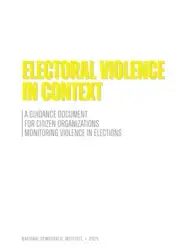Resources


Violence Against Women in Political Parties: Analysis of the Situation in Tunisia
This assessment details an analysis of women's political participation in Tunisia and sets out recommendations and action plans to address violence against women in political parties.

The State of Tunisian Democracy: Citizens express their views
In February 2018, NDI organized a set of 12 focus groups to gauge public attitudes on the performance of government and elected officials, key priorities for the country and expectations for the May local elections and ensuing decentralization process. The research marked the Institute's 19th round of focus groups since the revolution of 2011 and the eighth since 2014 elections. The report summarizes attitudes and concerns based on the responses of the 117 respondents.

No Party To Violence: Analyzing Violence Against Women in Political Parties
Taking the opportunity provided by its 2017 review of political party strengthening, "Reflect, Reform, Re-engage: A Blueprint for 21st Century Parties," NDI has revised its long-standing Win With Women political party assessment tool, including by adding guidance on measuring levels of and dealing with the violence that women members face within their parties.

Seeking "Tangible Change": Tunisians Express Views on the Transition and Expectation for Elected Representatives
Six years after Tunisia’s historic revolution, the first elected legislative body, the Assembly of People’s Representatives (parliament or ARP), as well as the executive branch, are striving to make the new-found democracy work.

Progress and Priorities in Tunisia: Tunisian Citizens Express Their Views
Since March 2011, the National Democratic Institute (NDI) has conducted regular qualitative research in Tunisia to provide political and civic leaders with objective information about citizens’ attitudes. From August 20 to 27, 2016, NDI organized its 16th round of research—the fifth round conducted since the 2014 elections—to gauge citizens’ opinions on the performance of the parliament and members of parliament (MPs), assess their views on some pressing matters facing the country, and ascertain their awareness of and expectations for the upcoming decentralization process and local elections.
